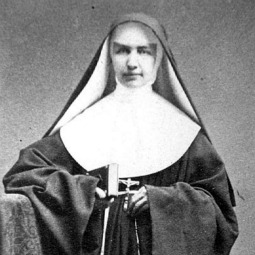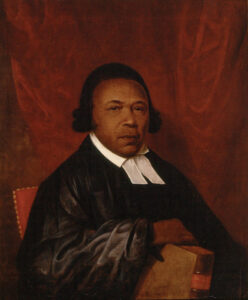Welcome to another day in this long and winding saintly road that is Lent Madness. Today we get Marianne Cope taking on Absalom Jones with the prize being a date in the Elate Eight with Catherine Booth.
Yesterday, in the greatest margin of victory thus far in our fair little Lenten bracket, Benedict the Moor trounced Euphrosyne 85% to 15%.
Before rushing into the voting booth, please take a moment to give thanks to this year's Celebrity Bloggers. These folks work for peanuts (well, free mugs) to illuminate the lives of our 32 saints. We give them very few words in which to accomplish this and, beyond the first round, very little time. With most of our writers intensely busy during this season (comes with the ecclesiastical territory), and a rabid crowd of Lent Madness adherents analyzing their every jot and tittle, it's not always an enviable task.
One of the reasons we love the comment section is that the lives of the competing saints are often illuminated in ways that space constraints do not allow. Plus, the unique perspectives of the Lent Madness community paint a much fuller picture than any one writer can offer. Thank you for continuing with us on this journey, and please join us in gratitude for our wonderfully faithful and talented stable of writers.
Marianne Cope
 Marianne Cope (builder of schools, hospitals, and general accomplisher of all things) is only the second American woman to be beatified by the Vatican.
Marianne Cope (builder of schools, hospitals, and general accomplisher of all things) is only the second American woman to be beatified by the Vatican.
She founded St. Joseph’s Hospital in Syracuse, New York, which was one of the first 50 general hospitals in the United States. Marianne and her order purchased a saloon and dance hall and converted it into a hospital. It is also still there, but I wouldn’t advise paying an impromptu visit—we’re in a pandemic.
After Marianne established several hospitals and schools in Central New York (which we deeply appreciate), she took several of her order to Hawai’i, at the invitation of the king, who required someone to care for the lepers’ colony on the island.
She said: “I am hungry for the work and I wish with all my heart to be one of the chosen Ones, whose privilege it will be, to sacrifice themselves for the salvation of the souls of the poor Islanders... I am not afraid of any disease, hence it would be my greatest delight even to minister to the abandoned ‘lepers.’"
When Marianne arrived in November of 1883, she was sent to the hospital in O’hau, and put in charge of triage—the more severe cases were to be sent to Fr. Damien (former Lent Madness star) on Molokai, and everyone else was to stay put on O’hau. Having set that up successfully, Marianne went off to set up another general hospital on Maui.
Soon, however, she had to come back to O’hau when she received word that the governmental administrator there was abusing patients. She informed the king that either the administrator was fired or she, and all of her hospital-building and-running nuns, would head back to Syracuse. The administrator was fired, and Marianne was awarded the running of the hospital.
One of the aspects of care that Sr. Marianne emphasized in her schools and in her hospitals was joy. She insisted that patients have access to gardens, music, games, and brightly colored garments while in the hospitals in O’hau and Maui, believing that happiness and laughter aided recovery just as much as cleanliness and medicine. Joy, to her mind, was an integral part of God’s will for us, and to neglect it was to neglect part of what it means to be human.
Absalom Jones
 Finding and maintaining accurate information about our African American ancestors isn't easy, even if they're the first African American priest in The Episcopal Church. Since the Saintly Scorecard was published, Absalom Jones's biography is updated with errors corrected. So that you're fully informed:
Finding and maintaining accurate information about our African American ancestors isn't easy, even if they're the first African American priest in The Episcopal Church. Since the Saintly Scorecard was published, Absalom Jones's biography is updated with errors corrected. So that you're fully informed:
The updated biography includes an autobiographical sketch. Here, Jones talks about his love of learning and reading.
"I was small, when my master took me from the field to wait and attend on him in the house; and being very fond of learning, I was careful to save the pennies that were given to me by the ladies and gentlemen from time to time. I soon bought myself a primer, and begged to be taught by any body that I found able and willing to give me the least instruction. Soon after this, I was able to purchase a spelling book; for as my money increased, I supplied myself with books, among others, a Testament. For, fondness for books, gave me little or no time for the amusements that took up the leisure hours of my companions. By this course I became singular, and escaped many evils, and also saved my money."
In a panel discussion called Absalom Jones and the Essential Worker: Yellow Fever 1793 to COVID 2019, moderator Dr. Nell Braxton Gibson said: "[Absalom Jones] was more than the first African American priest. He was also a community organizer, essential worker, teacher, and founder of social justice organizations."
When the Yellow Fever outbreak hit Philadelphia, Jones and Allen organized people to help. When faced with negative press, Jones and Allen wrote A Narrative of the Proceedings of the Black People During the Late Awful Calamity in Philadelphia, in the Year 1793: and a Refutation of some Censures, thrown upon them in some late Publications.
"We set out to see where we could be useful. We visited upwards of twenty families that day - they were scenes of woe indeed! The Lord was pleased to strengthen us, and remove all fear from us, and disposed our hearts to be as useful as possible."
Absalom Jones and Richard Allen gave us an incredible gift with this small manuscript: they told the story. When you read it, you'll discover stories of courage, heartbreak, faithfulness, and continued inequities, such as stories of black people who helped the sick with no compensation. When they got sick and died, no one helped their families. Jones and Allen remind us that no matter how we've been harmed, we must remember that God calls us to forgive. We have so much to learn from our brother Absalom.
[poll id="322"]